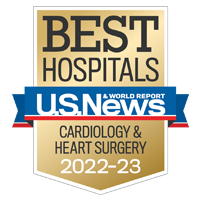
Long QT Syndrome
Long QT syndrome (LQTS) is an abnormality in the heart's electrical system that may cause very fast and potentially dangerous heart rhythms or arrhythmias called torsade de pointes. These arrhythmias may cause sudden loss of consciousness and in some cases, sudden cardiac death.
"Long QT" refers to the abnormal pattern on an electrocardiogram (ECG), the test that records the electrical activity of the heart. The "QT" interval is the ECG measure of the period when the lower chambers of your heart are triggered to contract and then prepare to contract again. These chambers are called ventricles.
When Long QT occurs, the interval is longer than usual, triggering a dangerous, abnormal rhythm.
Our Approach to Long QT Syndrome
Over the past decades, UCSF has helped pioneer breakthroughs in the understanding and treatment of genetic arrhythmias (inherited heart rhythm disorders), such as long QT syndrome. Our team includes electrophysiologists – cardiologists who subspecialize in heart rhythm disorders – as well as experts in general cardiology, genetics and genetic counseling. Working together, we care for patients and their families by offering evaluations and treatments not available elsewhere in the western United States.
We are committed to helping our patients with long QT syndrome live long, healthy lives. Our team can often manage the disorder using medications. Less commonly, patients may require implantable cardioverter defibrillators (ICDs), devices that detect abnormal heartbeats and deliver an electrical shock to reset the heart's normal rhythm. UCSF participated in the clinical trials that led to federal approval of ICDs, and we offer expert care before, during and after insertion of an ICD.
Our patients may also have access to experimental therapies being evaluated in clinical trials.
Awards & recognition
-

Among the top hospitals in the nation
-

One of the nation’s best in cardiology & heart surgery
UCSF Health medical specialists have reviewed this information. It is for educational purposes only and is not intended to replace the advice of your doctor or other health care provider. We encourage you to discuss any questions or concerns you may have with your provider.





